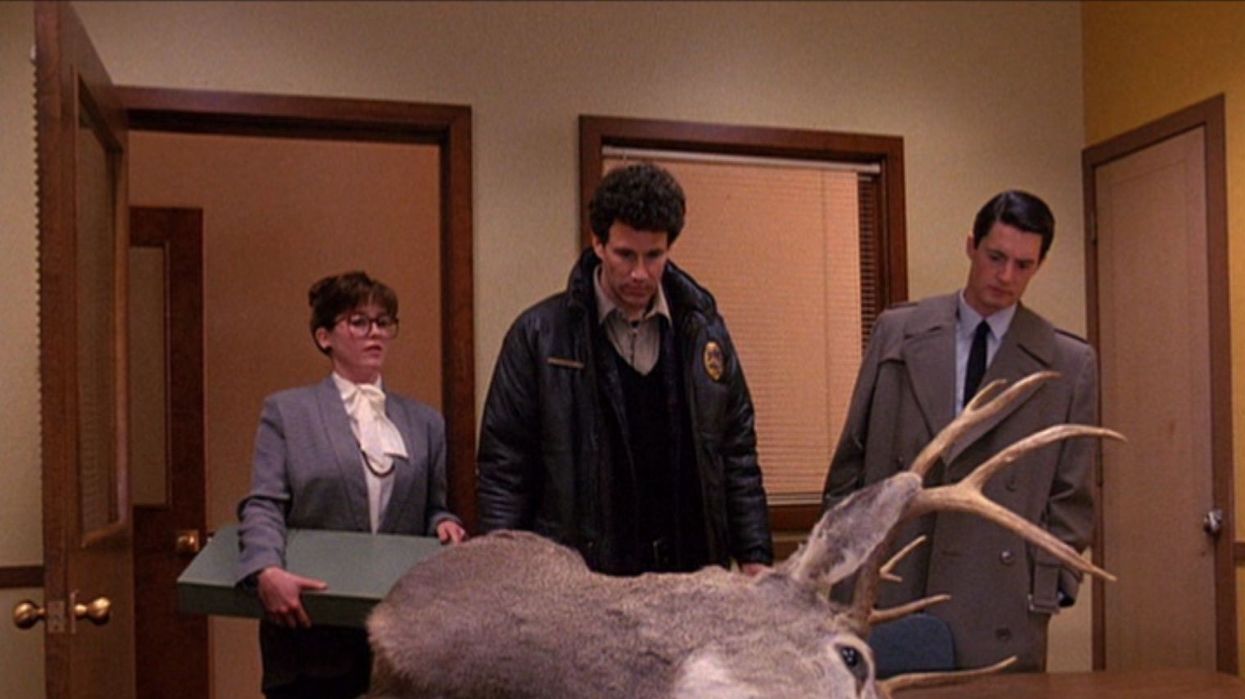How The 'Twin Peaks' Pilot Changed Television (Free Script Download)
Twin Peaks debuted in 1990 and changed TV. But how?

No one really believes a drama could attract viewers on a Thursday night. See, sitcoms ruled the late 80s and early 90s. Shows like Married... with Children and Cheers ate up all the time slots and brought in tens of millions of people every week.
The successful dramas were procedurals and daytime soaps—and both those genres had horribly failed on Thursdays.
But then came Twin Peaks. This was a drama with an overarching story for the season. It was a murder mystery that played with form and reality. It was a humungous risk. And it was going to go up against Cheers, the most popular sitcom of all time.
People had little to no hope in the show.
It was an ABC drama that seemed kinda dark for modern audiences. In fact, in a private screening before it aired, media analyst and advertising executive Paul Schulman said, "I don't think it has a chance of succeeding. It is not commercial, it is radically different from what we as viewers are accustomed to seeing, there's no one in the show to root for."
Well, people quickly found out.
The pilot episode, also known as Northwest Passage, premiered on the ABC Network on Sunday, April 8, 1990. It was written by series creators Mark Frost and David Lynch, and directed by Lynch. The pilot follows the characters of Dale Cooper and Harry S. Truman as they investigate the death of popular high school student Laura Palmer.
Twin Peaks debuted to 33% of the available audience watching and only grew from there. Everyone who said the show would flop was proven incalculably wrong. It went on to solid ratings and to change the landscape of TV ever since.
You can read and download the Twin Peaks pilot here.
And then check out this video from Karsten Runquist that really hypes the show and its impact.
How the Twin Peaks Pilot Changed Television
It's hard to imagine the number of people who were watching broadcast TV in the early 90s.
Twin Peaks' pilot was the highest-rated movie for the 1989-90 season with a 22 rating. In its first broadcast as a regular one-hour drama series, Twin Peaks scored ABC's highest ratings in four years in its 9 p.m. Thursday time slot.
And this was not then finding a new audience, it was them taking audiences from all over.
The show also reduced NBC's Cheers' ratings as it progressed because people deemed it "Must-see TV". In fact, every episode also added new viewers because of what ABC's senior vice-president of research, Alan Wurtzel, called "the water cooler syndrome," in which people talked about the series the next day at work.
That's right, Twin Peaks was your original water-cooler TV show (I'm willing to hear other entries).
The season was shaped around a murder. Everyone tuned in weekly to see who killed Laura Palmer and to find out what peculiar things were happening in town.
For its first season, Twin Peaks received 14 nominations at the 42nd Primetime Emmy Awards. The noms included Outstanding Drama Series, Outstanding Lead Actor in a Drama Series (Kyle MacLachlan), Outstanding Lead Actress in a Drama Series (Piper Laurie), Outstanding Supporting Actress in a Drama Series (Sherilyn Fenn), Outstanding Directing in a Drama Series (David Lynch), Outstanding Writing in a Drama Series (David Lynch and Mark Frost), Outstanding Writing in a Drama Series (Harley Peyton), Outstanding Art Direction for a Series, Outstanding Achievement in Main Title Theme Music, Outstanding Achievement in Music Composition for a Series (Dramatic Underscore), Outstanding Achievement in Music and Lyrics, and Outstanding Sound Editing for a Series.
The show only won for Outstanding Costume Design and Outstanding Editing for a Series—Single Camera Production.
Still, the impact was much more than ratings.
Networks scrambled to find noisier shows that would get people talking the next day. The reign of procedurals, where you saw a problem of the week, was beginning to end. Audiences showed they were open to more cinematic storylines.
As Entertainment Weekly said, "The show itself was only fitfully brilliant and ultimately unfulfilling, but the cult lives, fueled by nostalgia for the extraordinary pop phenomenon it inspired, for its significance to the medium (behold the big bang of auteur TV!), and for a sensuous strangeness that possesses you and never lets you go."
Nowadays we assume every show comes with an A-list director pairing, but Twin Peaks was most responsible for that.
Even as we shift away from the actual week-to-week water-cooler show (Game of Thrones might be our last one) into a streaming effect, people are still trying to capture the magic of being talked about.
The shows we know and love today don't only have that, but they have complex and interesting characters who walk on both sides of the law.
Twin Peaks was integral to planting the seeds that became peak TV, and as we look back on it, is one of the reasons people believed prestige shows could find an audience.
Are you a Twin Peaks fan?
Let us know in the comments.











